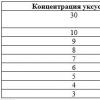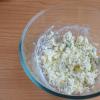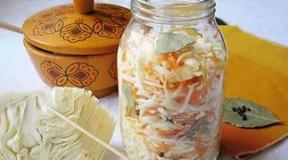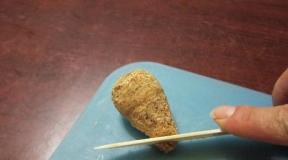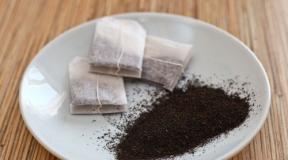The benefits and possible harm of sour cream for the body. Sour cream: the benefits and harms of this food product
High-quality, tasty and healthy dairy product sour cream is made of selected pasteurized cream and sourdough. The cream from which sour cream is made must be made from fresh natural and whole milk. Sour cream contains many vitamins and microelements necessary for the human body, as well as proteins, fats, carbohydrates, saccharides, unsaturated and organic acids, ash and cholesterol. Sour cream is useful because it contains lactic acid bacteria. This fermented milk product is perfectly absorbed by the body, since during fermentation, cream and milk proteins change their structure. The use of sour cream has a beneficial effect on digestion; it is included in the dietary menu of many medical institutions. Sour cream is a widespread product of the peoples of the former USSR, because there is no such product abroad, but only cream, which is why it is called “Russian cream”.
The quality of sour cream directly depends on the fat content and freshness of this product. There are many varieties of sour cream on store shelves, consider sour cream with fat content:
- 12% (low fat).
- 15% (low fat).
- 18% (medium fat).
- 25% (classic).
- 30% (bold).
- 40% (bold).
Sour cream 12% fat Is the cream after fermentation. The starter culture is thermophilic and mesophilic streptococci, which guarantee everyone's favorite sour cream flavor. The chemical composition of sour cream 12% fat includes vitamins:
- Groups B, A, PP, E, H, C, choline.
- Chemical elements:
- sodium, calcium, magnesium, potassium, phosphorus, chlorine;
- zinc, iron, iodine, selenium, copper;
- manganese, fluorine, molybdenum, cobalt
100g of sour cream 12% fat contains:
- Water - 78.5.
- Proteins - 2.7.
- Fats - 12.
- Carbohydrates - 3.9
- Kcal - 133.
Sour cream 12% fat is a dietary product. It tastes just as tasty, just the consistency of low-fat sour cream is much thinner than fat. Sour cream is widely used for the preparation of various sauces, as an addition to the dough and as an independent product for pancakes, dumplings, dumplings, cabbage rolls, etc.
Sour cream 15% fat Is a demanded and popular food product. It is prepared like any sour cream from cream, which is normalized and fermented with thermophilic and mesophilic streptococci. Sour cream 15% fat refers to low-fat, therefore it is widely used in dietary nutrition. This type of sour cream contains minerals:
- Sodium, calcium, magnesium, potassium, chlorine.
- Phosphorus, zinc, iron, selenium, iodine.
- Copper, fluorine, manganese, cobalt, molybdenum.
- Vitamins:
- A (RE), A, PP, D, E (TE);
- C, H, group B, choline.

100g of sour cream 15% fat contains:
- Water - 77.5.
- Proteins - 2.6.
- Fats - 15.
- Carbohydrates - 3.
- Kcal - 158.
Sour cream 15% fat is both an independent product and an excellent salad dressing. Sour cream is an ingredient for the preparation of various casseroles and pureed soups, it is added to the dough.
Sour cream 18% fat - fermented milk food product. The stages of preparation of this product consist of separation, fermentation, when special bacteria are added that make up the leaven. It is at this stage that the question of the fat content of the final product is resolved. Sour cream with a fat content of 18% is considered to be medium fat, thick, it is widely used in cosmetology. This type of sour cream contains vitamins:
- A (RE), A, PP, E, D, Group B, C, H, choline.
- Minerals are presented:
- sodium, calcium, magnesium, potassium;
- chlorine, phosphorus, zinc, iron, iodine, selenium;
- copper, fluorine, manganese, cobalt, molybdenum.

100g of sour cream with 18% fat contains:
- Water - 72.8.
- Proteins - 2.5.
- Fats - 18.
- Carbohydrates - 3.6.
- Kcal - 184.
Sour cream with a fat content of 18% is widely used in cooking, especially for sauces. This type of sour cream is also used as a seasoning for pancakes, meatballs, cabbage rolls, dumplings, dumplings, pancakes, etc.
Sour cream 25% fat - This is a classic type of sour cream. The production of this type of sour cream is no different from the previous ones. Sour cream with a fat content of 25% contains vitamins:
- B2, B12, A, C, E, PP.
- Contains micro and macro elements and amino acids.

100g of sour cream 25% fat contains:
- Water - 68.2.
- Proteins - 2.6.
- Fats - 25.
- Carbohydrates - 2.5.
- Kcal - 248.
This type of sour cream is especially popular with the consumer. It is added to pickles, hodgepodge, borscht; fish dishes baked in sour cream sauce are popular. This type of sour cream is used for delicious desserts, creams, baked goods. People who lead a healthy lifestyle widely use sour cream in their diets, enriching their diet with healthy fermented milk food.
Sour cream 30% fat - due to its taste and unforgettable taste, it has become a favorite product of many consumers. Sour cream is prepared from pasteurized milk and a special starter culture, which includes lactic acid streptococci. High-quality sour cream is made from natural cream, so this product is not dietary due to its high fat content. This type of sour cream contains a lot of phosphorus, calcium, iron, as well as vitamins A, C, PP, groups B, E.

100g of sour cream with a fat content of 30% contains:
- Water - 63.4.
- Proteins - 2.4.
- Fats - 30.
- Carbohydrates - 3.1.
- Kcal - 294.
Sour cream has beneficial properties. It is well absorbed, stimulates digestion, and is used to prevent atherosclerosis. This fermented milk product is widely used in cosmetology.
Sour cream 40% fat - is prepared from pasteurized cream, fermented with special lactic acid bacteria. This type of sour cream 40% is fatty sour cream. It is white in color, thick in consistency, pleasant in taste, homogeneous, has a slightly sour smell. High-fat sour cream is a very healthy product. It contains vitamins B2, B12, PP, ascorbic acid and minerals. This type of sour cream also contains lecithin, with the help of which cholesterol is not deposited on the walls of blood vessels.

100g of sour cream 40% fat contains:
- Water - 54.2.
- Proteins - 2.4.
- Fats - 40.
- Carbohydrates - 2.6.
- Kcal - 381.
Choline, which is contained in this type of sour cream, has a positive effect on the functioning of nerve cells, improves brain function. High-fat sour cream promotes bile secretion, improves bowel function, suppresses harmful microflora. This type of 40% sour cream contains four times less cholesterol than butter.
Fatty sour cream is a favorite type of sour cream among cooks. Gourmet dishes are prepared from it, for example, banosh corn porridge, creams, sauces, it is seasoned in salads, first courses, served for breakfast as a separate dish, etc.
Useful properties of sour cream
- Sour cream contains almost half of the most important chemical elements, a complex of vitamins, macro- and microelements.
- Sour cream is rich in complete animal protein, carbohydrates, fatty and organic acids, natural sugars.
- Sour cream has a beneficial effect on the digestion process, since this product is well absorbed by the human body.
The harmful properties of sour cream
- Sour cream must certainly be fresh and of high quality. When buying a product in a store, carefully read the composition and date of manufacture.
- High-fat sour cream is undesirable for people with obesity or those who are on a diet for weight loss.
Sour cream and diet food
Useful information for those counting calories and grams in their diet:
- One teaspoon contains 10g sour cream.
- One tablespoon contains 25g sour cream.
- One glass contains 250g sour cream.
Diet for weight loss on sour cream
This diet allows not only to lose weight, but also normalizes metabolism, removes excess fluid from the body, improves bowel function.
The diet lasts no more than 2-3 days. During this time, you can lose up to 2 kg. You can repeat the diet every 6 days for a month. At this time, limit sweet, flour, fatty foods.
The daily diet includes:
- 400g 20-30% sour cream in 5 doses, every 3 hours (80g each).
- Drink rosehip infusion (1-2 glasses). You can drink the drink during the break of taking sour cream.
- Eat sour cream with a coffee spoon (saturation occurs faster).
Those who are professionally involved in sports and those who have health problems cannot sit on this diet.
Introduce sour cream into the diet of your family, and be healthy.
Sour cream is a fermented milk product that is obtained by fermenting cream and adding specific bacteria to it. In general, this product was distributed for a long time only in Russia, in Europe, for example, it was actively consumed only after the Second World War. Sour cream is an amazing product that is used in the preparation of most dishes. Who can imagine borscht without sour cream? But what about the famous white sauces for meat and vegetable dishes? Even desserts cannot do without this fermented milk product - creams, dough, pouring ... In general, sour cream is considered a frequent "guest" on the table, but how useful is it and can it be consumed by everyone without exception?
Sour cream - composition and calorie content
The composition of the product in question is quite rich - there are vitamins, and trace elements, and sugar substances (natural), and organic acids. The composition of sour cream also contains biotin - a trace element that is necessary to maintain the efficiency of the whole body and preserve the youthfulness of the skin. In addition, sour cream is rich in animal protein, which makes it indispensable for the cells of the body.
Sour cream composition:
- Ash 0.5 g
- Mono- and disaccharides 3.4 g
- Cholesterol 87 mg
- EFA - Saturated Fatty Acids 11.9 g
- Water 72.8 g
- Organic acids 0.8 g
- Vitamin PP 0.6 mg
- Vitamin H 3.6 μg
- Vitamin E 0.4 mg
- Vitamin D 0.1 μg
- Vitamin C 0.3 mg
- Vitamin B12 4 μg
- Vitamin B9 8.5 μg
- Vitamin B6 0.07 mg
- Vitamin B2 0.11 mg
- Vitamin B1 0.03 mg
- Vitamin A 160 μg
- Beta carotene 0.06 mg
- Cobalt (Co) 0.3 μg
- Molybdenum (Mo) 5 μg
- Fluorine (F) 14 μg
- Selenium (Se) 0.3 μg
- Manganese (Mn) 0.003 mg
- Copper (Cu) 20 mg
- Iodine (I) 7 μg
- Zinc (Zn) 0.24 mg
- Iron (Fe) 0.2 mg
- Sulfur (S) 25 mg
- Chlorine (Cl) 61 mg
- Phosphorus (P) 60 mg
- Potassium (K) 109 mg
- Sodium (Na) 35 mg
- Magnesium (Mg) 8 mg
- Calcium (Ca) 86 mg
Vitamins
Minerals
Separately, it is worth discussing the calorie content of the product in question - it has a variable character and depends only on the fat content of the sour cream. The least calories in 10% sour cream - only 159 Kcal per 100 grams of product, but in a 30% product, the calorie content will already be almost 291 Kcal.
Useful properties of sour cream
 Sour cream is useful for many people - this is also confirmed by official medicine. It is needed for people who have disturbances in the digestive system - for example, if appetite is reduced or completely absent, there are chronic ones, or putrefactive processes occur in the intestines (this can happen when, and the bacteria contained in sour cream simply normalizes the intestinal microflora).
Sour cream is useful for many people - this is also confirmed by official medicine. It is needed for people who have disturbances in the digestive system - for example, if appetite is reduced or completely absent, there are chronic ones, or putrefactive processes occur in the intestines (this can happen when, and the bacteria contained in sour cream simply normalizes the intestinal microflora).
If you regularly eat sour cream in combination with fresh carrots, then the body's immune system will be significantly strengthened, and the combination of sour cream with will help to raise your mood. The fermented milk product under consideration also "works" well in relation to the normalization of the blood composition - it is often recommended for patients with diagnosed, weakened after surgery or a long illness.
Sour cream is very useful for men's health:
- maintains potency at the proper level, even at the age of 50 and older;
- provides support to muscles, gives strength and nutrition, which allows you to maintain the tone of the body at the proper level at any age;
- nourishes hair, which inhibits the spread of gray hair and associated with age-related changes in the body.
The product in question is also needed for the female half of humanity:
- able to normalize and stabilize hormonal levels, which is especially important during menstruation and menopause /;
- helps to restore the health of the skin of the face and décolleté - professional cosmetics are produced on the basis of sour cream even on an industrial scale;
- essential during diets, as it promotes normal bowel function and prevents constipation.
Sour cream will also bring a lot of benefits to the child's body - it can be introduced into the baby's menu already in a year, but you need to give preference to a low-fat product. As for the village product, natural, the child's body can easily and without consequences assimilate it only at the age of three.
Despite the obvious benefits of the fermented milk product in question, not everyone is recommended to eat it.
Possible harm to sour cream and contraindications to use
 There are clear restrictions that apply to the product in question. For example, it is impossible to introduce sour cream into the menu for those people who have already been diagnosed with or / duodenum, which is due to the high content of organic acids in it. Doctors do not recommend to abuse sour cream and those who have problems with the liver and / or gallbladder, although there are no categorical contraindications for this product (it is advisable to eat sour cream in this case in the morning).
There are clear restrictions that apply to the product in question. For example, it is impossible to introduce sour cream into the menu for those people who have already been diagnosed with or / duodenum, which is due to the high content of organic acids in it. Doctors do not recommend to abuse sour cream and those who have problems with the liver and / or gallbladder, although there are no categorical contraindications for this product (it is advisable to eat sour cream in this case in the morning).
Note: store sour cream should be consumed in small quantities, since it always contains preservatives that are not useful elements. Doctors say that you cannot combine the dairy product in question with fried potatoes, any cereals and bakery products.
Sour cream is an extremely tasty and healthy product that should be consumed in small quantities. If you have a history of diseases of the gastrointestinal tract, liver or gallbladder, then the advisability of introducing sour cream into the menu should be consulted with your doctor.
Despite the fact that sour cream has always been considered a high-calorie product, it is very healthy. Even when losing weight, it must be included in the diet in moderation, consumed only in the morning or lunchtime. You can prepare a fermented milk product at home; this requires only natural fresh cream and a special ferment. 100 g of this sour cream contains about 104 kilocalories.
IT IS IMPORTANT TO KNOW! Fortune teller Baba Nina: "There will always be plenty of money if you put it under the pillow ..." Read more \u003e\u003e
- calcium;
- potassium;
- magnesium;
- sodium;
- iron;
- phosphorus;
- chlorine;
- beneficial bacteria.
- normalization of metabolism;
- stabilization of blood sugar levels;
- normalization of the nervous system;
- increased hemoglobin levels;
- improving the condition of the skin, hair, nails;
- slowing down the aging process.
- gastritis;
- ulcer;
- diabetes mellitus;
- high blood pressure;
- individual intolerance to milk protein.
- restoration of the skin;
- improved blood circulation;
- protection from the harmful effects of the external environment;
- normalization of the sebaceous glands.
Show all
The composition of the product and its useful properties
The fermented milk product contains not only proteins, fats and carbohydrates, but also other useful microelements.
Composition:
Sour cream is high-calorie and low-calorie. It is distinguished by the percentage of fat: it can be from 10 to 58 percent. Low-fat sour cream will not harm your figure and will be of great benefit to the human body.
Beneficial features:
Sour cream helps to preserve beauty, as it contains biotin - the vitamin of youth. It is recommended to regularly include it in the diet - no more than 2 tablespoons per day. The calorie content in such an amount of the product will be 52 kcal.
Nutritional value per 100 g depending on fat content:
The product will be useful only if it is made from natural cream.
For men
Sour cream should be included in the diet of men with potency problems. It contains a large amount of nutrients that properly affect the reproductive system, stimulate testosterone production and improve potency.
To increase sexual desire, you need to consume a cocktail of raw eggs and sour cream shortly before sexual intercourse. Men are advised to eat on an empty stomach a salad of nuts, seasoned with sour cream and honey, to improve reproductive function. You can drink a glass of tomato juice with a spoonful of sour cream for lunch to support men's health.

For women
Sour cream helps to saturate a woman's body with all the necessary microelements that contribute to preparation for pregnancy, childbirth, and other hormonal changes.
Sour cream is necessary for pregnant and lactating women, as it is rich in choline, on which the proper development of the child's brain depends. Proteins are involved in building muscle mass.
The product also supports beauty, is found in many diet programs, as part of cosmetics.

For children
You can add sour cream to the diet of children from 8 months if there is no allergy to milk protein. It is important to include in baby food only a natural product that is best prepared at home.
Sour cream is useful for a growing body, as it contains fluoride, calcium and zinc. These microelements help the correct growth and development of the child's skeletal system, increase immunity. You can add it to soups, salads, main courses.
For losing weight
Despite the fact that the product is considered high in calories, it is recommended to include it in the diet of those who are losing weight. The fat content should be no more than 20%, and the daily rate should not exceed 1 tablespoon. It is better to eat sour cream in the morning or at lunchtime so that by the evening all the calories are consumed.
Fermented milk product is best combined with fruits and vegetables. When losing weight, you can use it with cucumbers, tomatoes, green onions, leafy greens. Fat will be diluted with fiber, which will have a beneficial effect on the metabolic process.
To cleanse the intestines, you can make a salad with prunes for breakfast. This dish helps to remove toxins from the body, normalizes the intestines.
If you combine a diet with regular exercise, then the protein that is part of the product will help you quickly build a beautiful muscle relief.
Sour cream diet
The essence of such a diet is that the main product in the amount of 400 g is divided into five equal parts and consumed all day. In addition, 500 ml of rosehip broth is included in the diet. There is nothing else to eat.
Before starting to follow the diet, you should consult with your doctor, since only a nutritionist will be able to correctly select the fat content of sour cream.
A mono-diet can be observed for no more than three days. During this time, it is possible to lose up to 3 kilograms.
It is contraindicated to follow a sour cream diet when:
Mask for the face
The product is often used in cosmetology, as various face masks are prepared on its basis. The vitamins in the composition help maintain youthful and healthy skin. It is recommended to use sour cream masks for dry skin types. The mask provides:
To maintain youth, it is enough to mix a tablespoon of sour cream, the same amount of white clay and a vitamin E capsule. You can use a cosmetic product daily to care for mature skin. Recommended for use by women over the age of 35.
Contraindications
Harm to the body is possible with excessive use of sour cream. It contains a lot of cholesterol, so it should not be consumed in large quantities in order not to overload the cardiovascular system. It is not recommended to eat it for gastritis, ulcers, diarrhea, liver and kidney problems.
Sour cream is a fermented milk easily digestible product that can be added to soup or borscht, used with pancakes and cheesecakes, and seasoned with salads. The question of whether it is possible for babies to be given sour cream, whether it is useful for the child's body, interests many parents.
The fat content of sour cream is different - from 10% to 40%, although there is less cholesterol in it than in butter: 1 tsp. butter contains 9.5 g of cholesterol, while 10% sour cream contains only 3.4 g.
When and what sour cream can you give your baby
Fat (above 48%) sour cream is allowed to be consumed only by adolescent children who are not inclined to be overweight.
Pediatricians advise to start introducing sour cream into a child's diet no earlier than 2 years old and with a small amount. For this, dietary, that is, 10% sour cream, is suitable in order to reduce the load on the pancreas, the enzymatic activity of which has not yet been fully formed.
From 2.5 to 3.5 years old, you can give a child 15% sour cream. From 4 years old, the use of sour cream with a fat content of 15-25% is allowed. It is not recommended to give a fatty product to babies.
Fatty (48%) and high-fat (up to 58%) sour cream, with its excellent creamy taste, can be consumed by adolescents (not prone to obesity) in limited quantities due to the risk of digestive disorders and the high calorie content of the product. The higher the fat content of sour cream, the less protein it contains.
To begin with, 1 tsp. sour cream can be added to, curd, grated, vegetable puree. In the absence of intolerance, you can gradually increase the dose to 2-3 tsp. Unlike other fermented milk products, which must be included in the diet daily, sour cream and cream can be given 2-3 times a week.
If the baby is prone to allergies, it is better to postpone the use of sour cream for up to 3 years, replacing it with low-fat yogurt or baby cream, 5-10 g per day as part of various dishes.
What is the use of sour cream
Useful properties of a primordially Russian product are associated with the composition of sour cream:
- easily digestible proteins and valuable amino acids are necessary for the child's body as a building material for new cells;
- sour cream is a storehouse of trace elements necessary for the body (copper, sodium, sulfur, phosphorus, selenium, molybdenum, etc.): phosphorus and calcium are used to form bone tissue, potassium will provide normal cardiac activity, magnesium will strengthen the nervous system;
- fatty acids promote the absorption of fat-soluble vitamins, increase the synthesis of digestive enzymes, improve appetite;
- saturated fats in the form of conjugated linoleic acids in sour cream reduce the risk of heart disease, increase the body's defenses, and prevent;
- carbohydrates serve to provide the child's body with energy;
- sour cream contains many vitamins (A, E, H, D, choline, folic acid) involved in metabolic processes, the formation of immunity, ensuring the health of hair, skin, nails;
- choline normalizes lipid metabolism and central nervous system function;
- lecithin helps to develop intelligence and improve memory;
- the lactose contained in sour cream is necessary for the vital activity of lactobacilli (useful), this prevents development;
- the use of sour cream stimulates the emptying of the intestines, thereby preventing the development of fermentation and putrefactive processes in the intestines;
- in the process of fermentation, the structure of milk proteins changes, which contributes to their complete assimilation and rapid recovery of strength in case of fatigue.
Sour cream gives food a special flavor, which can improve a child's appetite.
Is it possible harm from sour cream
 Due to the functional immaturity of the enzymatic apparatus of the digestive system, the use of sour cream (even low-fat) by a child under 2 years old will lead to bloating, pain and stool disorders (diarrhea).
Due to the functional immaturity of the enzymatic apparatus of the digestive system, the use of sour cream (even low-fat) by a child under 2 years old will lead to bloating, pain and stool disorders (diarrhea). The consumption of sour cream can have an adverse effect on the child in such cases:
- if the baby is intolerant to lactose (milk sugar), an allergic reaction may occur;
- when introduced into the diet of a child under 2 years old: the digestion of sour cream will be difficult due to the presence of saturated fats in its composition and imperfection of the enzymatic capabilities of the digestive tract, which will cause diarrhea and;
- the child's consumption of high-fat sour cream can lead to metabolic disorders, malfunction of the endocrine glands, pathology of the liver and gallbladder;
- excessive sour cream in a child's diet can lead to (overweight);
- sour cream purchased in a store may contain preservatives, thickeners, etc., harmful to the child's body;
- the child's use of sour cream with an expired shelf life is fraught with the occurrence of food toxicoinfection, the manifestations of which will be nausea, vomiting, abdominal pain, diarrhea.
How to choose sour cream for a child
The choice of sour cream for a child should be based on 2 requirements:
- freshness;
- naturalness of the product.
When buying in a store, you should carefully read the expiration date and composition: the product for baby food should be natural, not contain stabilizers, preservatives, vegetable fats or other additives.
Sour cream should have a short term of sale - no more than 3-7 days. This will confirm the naturalness of the product. If the specified period of quality assurance is longer, it means that the composition contains preservatives.
Natural sour cream contains only 2 components - cream and sourdough. The presence of standardized cream in the composition indicates that the cream was diluted with skim milk to the required fat content.
The abbreviation “GOST” on the label confirms the naturalness and quality of the product, while the “TU” marking gives the manufacturers the right, depending on the technical conditions, to introduce additives without adhering to the standard.
The density of sour cream has long ceased to be a guarantee of its quality, since manufacturers can use thickeners and stabilizers, replace milk fat with vegetable, and milk proteins - with soy.
Attention should also be paid to the integrity of the packaging. Having opened the jar, you need to conduct a visual assessment of the product.
Quality and naturalness are evidenced by:
- homogeneity of the product without any lumps and separated liquid;
- white color (a slight yellowish tint is allowed);
- lack of extraneous unpleasant odors;
- fermented milk pleasant taste.
If these requirements do not meet these requirements, sour cream cannot be given to the child, because this may indicate violations in the process of manufacturing, transportation, storage of the product, and its contamination with pathogenic (pathogenic) microorganisms.
Homemade sour cream
It is not at all difficult to prepare sour cream for a child for a mother at home. This will give confidence in the naturalness and freshness of the product, the absence of harmful additives. The initial product for its production is baby cream of the required fat content.
To ferment them, special ferments are used (Evitalia, Yogurtel, Genesis, Vivo, Lactina), which can be purchased at the pharmacy.
For making, you can use a yogurt maker, a slow cooker or even a thermos. The lactic acid culture of the starter culture works at a temperature of 30 to 36 ° C, therefore, you should slightly warm the pasteurized or sterilized cream and add the starter culture in the appropriate dosage instructions. After 8-9 hours of content in a yogurt maker (multicooker), the product acquires thickness and taste. In a closed glass container, it is placed in the refrigerator for a day. The term of use of such sour cream is no more than 3 days.
In what form to give the child sour cream
In the child's diet, sour cream can be:
- add to borscht or soup;
- serve with casseroles, cheese cakes;
- mix it with cottage cheese;
- dressing a salad of fruits and vegetables;
- stew vegetables, meat and fish in sour cream - they will acquire a soft consistency and delicate taste;
- prepare sauce for meatballs;
- bake sour cream cookies.
Resume for parents
Up to 2 years of age, sour cream should not be introduced to the baby's diet, it is better to give him low-fat kefir or yogurt, baby cream. After 2 years, sour cream will be useful if you adhere to all the recommended rules without overusing the amount of the product. Making homemade sour cream, the mother will be confident in its quality and safety for the child's health.
About the benefits and harms of sour cream in the NTV program "Food is alive and dead" (see from 24:00 min.):
https://youtu.be/oOH5e4EHUYw
This fermented milk product, traditional for Russian cuisine, has been known for a very long time. The benefits and harms of sour cream are certainly a well-known and studied issue, since it is difficult to find another such milk product that is so popular. Now sour cream is produced and consumed in many countries of the world.
The extraordinary benefit of sour cream is its high content of many vitamins and organic acids, including biotin and beta-carotene. The composition of sour cream is rich in many trace elements, including magnesium, phosphorus, zinc and potassium. At the same time, sour cream is a very high-calorie product, since it is very high in fat.
The benefits of sour cream are especially manifested in the saturation of calcium, which is necessary for bone growth. Therefore, sour cream is considered useful for people of any age, for children and adults. Sour cream contains an incredible amount of animal proteins, sugars and water. Sour cream is recommended to be used in various combinations with and. It restores strength well, relieves stressful situations and depression.
The benefits of sour cream are great for people who have a weak digestive system. Sour cream has a good effect on the normalization of hormonal levels. It manifests itself in the ability to increase appetite, improve the reproductive functions of the human body.
Due to the fact that this dairy product is produced with a different percentage of fat, there is a benefit of sour cream for people who do not need extra calories. That is why sour cream is considered a dietary product that helps with stomach and intestinal disorders. Sour cream is very well absorbed in the body.
It is interesting that the cholesterol in sour cream is significantly less than in the composition of butter, so the benefits of sour cream are simply obvious. It is not only recommended to use it as a salad dressing, but sometimes it can be offered and spread instead of butter on bread.
The benefits of sour cream, as has long been found out, not only as a food product. It is also actively used as a cosmetic product. Many who do not use the services of salons, but maintain the normal condition of their skin on their own, are familiar with various masks where sour cream is mixed with. In addition, who did not have to escape from sunburn in the sultry summer, smearing themselves with sour cream. Sour cream nourishes the skin with everything it needs, helping it to overcome stress.
However, the harm of sour cream is manifested in combination with products such as cereals and bread. People who have heart disease and hypertension are often not advised to consume sour cream unnecessarily. Moreover, sour cream, if abused, can inevitably lead to disorders of fat metabolism. The consequence of this may be an increased load on the gallbladder and on the liver in general, which is fraught with the occurrence of disorders and serious diseases.
Sour cream, like many other milk products, requires strict adherence to storage conditions in order to exclude the harm of sour cream. Finding it for a long time at an unacceptable temperature, access of air can provoke the oxidation of milk fats, active reproduction of microorganisms. At the same time, the taste of sour cream can change from pleasant to rather disgusting, and in addition, such sour cream can even be poisoned.



